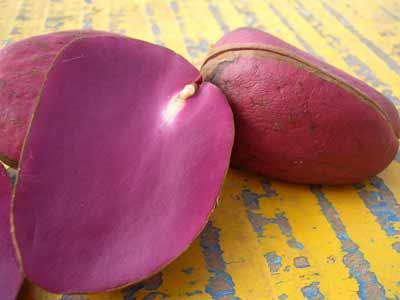The kola nut is the fruit of a genus of about 125 species of evergreen trees native to the tropical rainforests of Africa, and related to the South American genus Theobroma (Cacao). A friend who chewed kola described it has having a very bitter flavour. It contains high levels of caffeine and is chewed in many West African cultures. It is often used ceremonially, presented to tribal chiefs or presented to guests. It is preferred among African Muslims, who are forbidden to drink alcohol. Chewing kola nut can ease hunger pangs. Frequent chewing of the kola nut can also lead to stained teeth. Among the urban youth of West Africa, kola nut is becoming less popular. The fried was offered it when she was unwell and reported a full recovery from her condition.
Kola was used to make cola soft drinks, though today most of these mass-produced beverages use artificial flavourings. Outside mainland Africa, some species are cultivated for their nuts in Madagascar, Brazil, Jamaica and elsewhere in the humid tropics.
Kola nuts are often used to treat whooping cough and asthma. The caffeine present acts as a bronchodilator, expanding the bronchial air passages.
